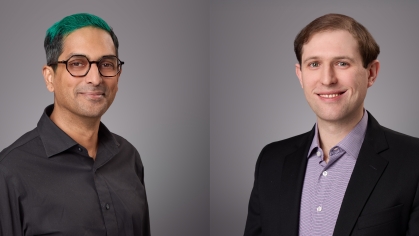Four Questions for Assistant Professor Daniel Burbano Lombana
Prior to joining the Department of Electrical and Computer Engineering, assistant professor Daniel Burbano Lombana completed an NYU Tandon School of Engineering Provost Postdoctoral Fellowship.
His research interests include dynamical systems and control theory with an emphasis on distributed network systems, collective animal behavior, swarm intelligence, and robot autonomy.
Four Questions for Assistant Professor Daniel Burbano Lombana
What fueled your passion for mechanical engineering?

Since I was a kid, I’ve been curious to know how electrical and electronic devices worked. I often used to take apart any device that interested me to try to figure out its function. I later understood that this process, which for me was just having fun, is known as reverse engineering.
As I grew up, I learned about electric current, motors, and basic circuits with transistors, which became my world – and fascinated me. This motivated me to learn more. As an undergraduate, I discovered a new branch of science: automatic control.
I was immediately attracted to this field once I learned that rigorous mathematics, arising from dynamical systems theory, could be used to model and design engineering solutions for a variety of applications not just for electrical systems but also for mechanical and biological systems. I dove deeper into this world in my doctoral studies, which led to my current research area.
What is your research about?
I’m interested in understanding how collective intelligence emerges from the interaction of simple units. For instance, the sum of individual contributions can’t explain the overall behavior of an ant colony or school of fish. These systems don’t require a central command station to orchestrate their individual actions – rather they use a set of distributed roles to self-regulate their motions with neighbors and the environment.
We are asking: what are the distributed mechanisms underlying the complexity observed in nature? How do animals navigate complex environments? How do they integrate sensory information in their brains and transform it into specific locomotory patterns?
Can we decode these intelligent distributed mechanisms and transform them into mathematical equations that can ultimately be used in engineering applications, such as robotics or power systems?
Who will benefit from your research?
Answering these questions will help us shed light on how collective intelligence emerges in nature, as well as formulate mathematical models, and design distributed control algorithms for the next generation of intelligent robot swarms and the future power grid. Distributed control solutions will ultimately offer a viable alternative to a central control station to maintain the function of the future power grid.
Where do you conduct your research?
Research in my Swarm Intelligence Laboratory is focused on studying the hows and whys of fish collective behavior and also designing bio-inspired control algorithms for engineer network systems such as robot swarms or the electrical power grid. Undergraduate and graduate students can contribute to hands-on or theoretical projects related to collective intelligence.


